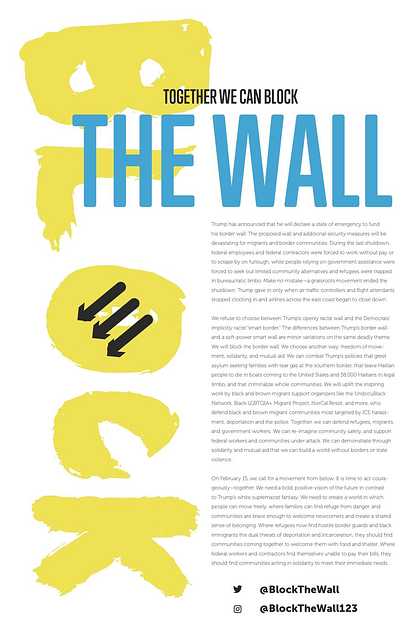Trump has announced that he will declare a state of emergency to fund his border wall. The proposed wall and additional security measures will be devastating for migrants and border communities. During the last shutdown, federal employees and federal contractors were forced to work without pay or to scrape by on furlough, while people relying on government assistance were forced to seek out limited community alternatives and refugees were trapped in bureaucratic limbo. Make no mistake—a grassroots movement ended the shutdown. Trump gave in only when air traffic controllers and flight attendants stopped clocking in and airlines across the east coast began to close down.
We refuse to choose between Trump’s openly racist wall and the Democrats’ implicitly racist “smart border.” The differences between Trump’s border wall and a soft-power smart wall are minor variations on the same deadly theme. We will block the border wall. We choose another way: freedom of movement, solidarity, and mutual aid. We can combat Trump’s policies that greet asylum seeking families with tear gas at the southern border, that leave Haitian people to die in boats coming to the United States and 58,000 Haitians in legal limbo, and that criminalize whole communities. We will uplift the inspiring work by black and brown migrant support organizers like the UndocuBlack Network, Black LGBTQIA+ Migrant Project, NorCal Resist, and more, who defend black and brown migrant communities most targeted by ICE harassment, deportation and the police. Together, we can defend refugees, migrants, and government workers. We can re-imagine community safety, and support federal workers and communities under attack. We can demonstrate through solidarity and mutual aid that we can build a world without borders or state violence.
On February 15, we call for a movement from below. It is time to act courageously—together. We need a bold, positive vision of the future in contrast to Trump’s white supremacist fantasy. We need to create a world in which people can move freely, where families can find refuge from danger, and communities are brave enough to welcome newcomers and create a shared sense of belonging. Where refugees now find hostile border guards and black immigrants the dual threats of deportation and incarceration, they should find communities coming together to welcome them with food and shelter. Where federal workers and contractors find themselves unable to pay their bills, they should find communities acting in solidarity to meet their immediate needs.
